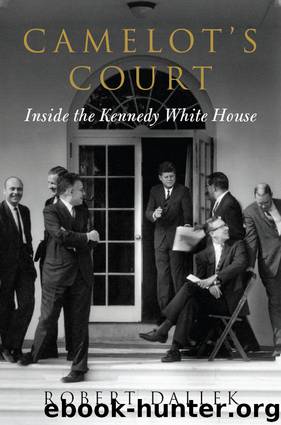Camelot's Court: Inside the Kennedy White House by Robert Dallek

Author:Robert Dallek [Dallek, Robert]
Language: eng
Format: epub
Tags: History, Non-Fiction, Politics, Biography
ISBN: 9780062065841
Amazon: 006206584X
Goodreads: 17349080
Publisher: Harper
Published: 2013-10-07T11:00:00+00:00
Kennedy did not dispute the failure to do big things at home. But for the time being, he felt that foreign dangers still had to command his primary attention. And Latin America, where he continued to see communism as an aggressive competitor for regional control, posed a grave potential setback for the United States in the Cold War. He was determined to counter the threat with the Alliance for Progress. True, it was just getting started in improving the southern republics, but Kennedy described the hemisphere as alive with “the quickening of hope” and the Latin republics as committed to “a new and strenuous effort of self-help and self-reform.” Yet “the one unchangeable certainty is that nothing is certain or unchangeable.”
In Kennedy’s view, the greatest danger to Western Hemisphere freedom remained Castro’s hopes of exporting his revolutionary fervor. At a National Security Council meeting on January 18, 1962, Kennedy wanted to make sure that Castro would be isolated at a coming meeting at Punta del Este. But even if they could blunt his influence at the conference, Kennedy expected Castro still to be a very large problem. While he believed that some way would eventually have to be found to deal with the Cuban dilemma, he saw nothing that could be done at once. The next day, when Bobby Kennedy met with CIA and military officials, Bobby explained that the administration had been lying low since the failure at the Bay of Pigs. But because Cuba was so rapidly becoming a communist police state, the ousting of Castro was “the top priority in the United States Government—all else is secondary—no time, money, effort, or manpower is to be spared.” There could be no misunderstanding on the responsibility of the country’s defense agencies “to carry out this job.” Bobby quoted the president as telling him that “the final chapter on Cuba has not been written,” and Bobby added, with a pugnacity that reflected his combativeness, “it’s going to be done and will be done.”
On January 20, Lansdale gave marching orders to members of a Caribbean Survey Group. Invoking Bobby’s directive, he said that “it is untenable to say that the United States is unable to achieve its vital national security and foreign policy goal re Cuba. . . . We have all the men, money, material, and spiritual assets of this most powerful nation on earth.” Every member of the group was instructed to meet and if possible exceed deadlines in reaching the goal of turning Cuba away from communism. In February, Lansdale set a timetable stretching from March to October 1962, when Castro was to be overthrown and a new government put in place. In the meantime, the Joint Chiefs were to make contingency plans for U.S. military intervention in Cuba. In March, however, Kennedy put a damper on plans for direct military action. Still concerned that U.S. military intervention would undermine the Alliance for Progress, Kennedy discouraged all talk of air or ground attacks on the island. At a
Download
Camelot's Court: Inside the Kennedy White House by Robert Dallek.epub
This site does not store any files on its server. We only index and link to content provided by other sites. Please contact the content providers to delete copyright contents if any and email us, we'll remove relevant links or contents immediately.
The Secret History by Donna Tartt(16714)
The Social Justice Warrior Handbook by Lisa De Pasquale(11506)
Thirteen Reasons Why by Jay Asher(7829)
This Is How You Lose Her by Junot Diaz(5822)
Weapons of Math Destruction by Cathy O'Neil(5072)
Zero to One by Peter Thiel(4862)
The Myth of the Strong Leader by Archie Brown(4809)
Promise Me, Dad by Joe Biden(4474)
Beartown by Fredrik Backman(4463)
How Democracies Die by Steven Levitsky & Daniel Ziblatt(4443)
Stone's Rules by Roger Stone(4435)
The Fire Next Time by James Baldwin(4369)
100 Deadly Skills by Clint Emerson(4104)
A Higher Loyalty: Truth, Lies, and Leadership by James Comey(4055)
Rise and Kill First by Ronen Bergman(4040)
The David Icke Guide to the Global Conspiracy (and how to end it) by David Icke(3911)
The Farm by Tom Rob Smith(3893)
Secrecy World by Jake Bernstein(3803)
The Doomsday Machine by Daniel Ellsberg(3753)
